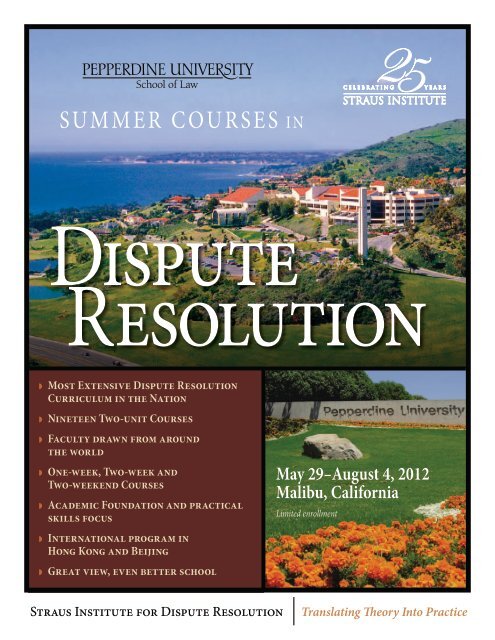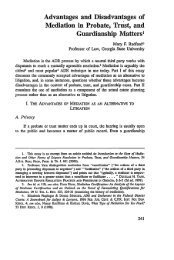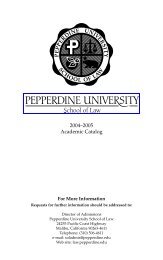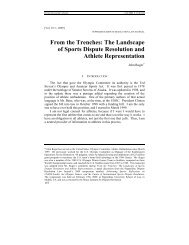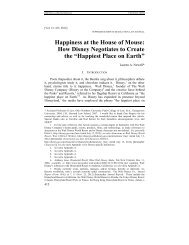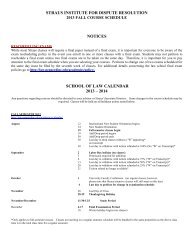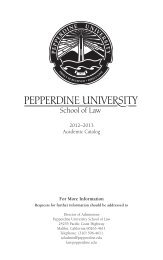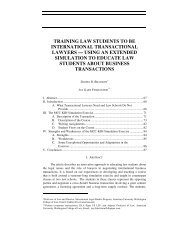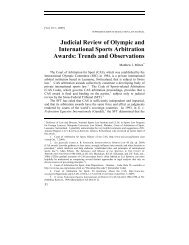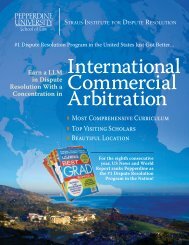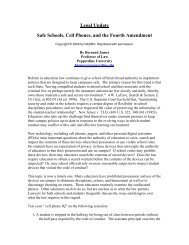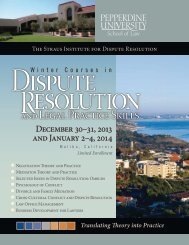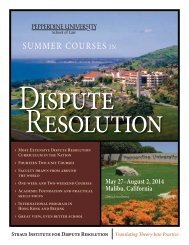SummeR CouRSeS In - Pepperdine University School of Law
SummeR CouRSeS In - Pepperdine University School of Law
SummeR CouRSeS In - Pepperdine University School of Law
You also want an ePaper? Increase the reach of your titles
YUMPU automatically turns print PDFs into web optimized ePapers that Google loves.
Summer Courses in<br />
Dispute<br />
Resolution<br />
w Most Extensive Dispute Resolution<br />
Curriculum in the Nation<br />
w Nineteen Two-unit Courses<br />
w Faculty drawn from around<br />
the world<br />
w One-week, Two-week and<br />
Two-weekend Courses<br />
w Academic Foundation and practical<br />
skills focus<br />
w <strong>In</strong>ternational program in<br />
Hong Kong and Beijing<br />
w Great view, even better school<br />
May 29–August 4, 2012<br />
Malibu, California<br />
Limited enrollment<br />
Straus <strong>In</strong>stitute for Dispute Resolution<br />
Translating Theory <strong>In</strong>to Practice
The 2012 Summer Program <strong>of</strong>fers students an unparalleled<br />
opportunity to obtain the finest dispute resolution educational experience<br />
in substantive theories, exposure to the field’s literature, extensive practical<br />
skills development, and stimulating dialogue with students and faculty<br />
drawn from around the world.<br />
The 2012 Summer Program<br />
Nowhere else in America can law students and pr<strong>of</strong>essionals find the “<strong>Pepperdine</strong> Experience” in dispute resolution:<br />
w A faculty <strong>of</strong> academics and practitioners drawn from<br />
around the world<br />
w The most extensive dispute resolution curriculum in<br />
legal education<br />
w Convenient one-week, two-week and two-weekend formats<br />
w Class locations in Malibu and Orange County<br />
w More than 300 law students and pr<strong>of</strong>essional colleagues<br />
with whom to study<br />
w The LL.M. in Dispute Resolution<br />
w The Master’s <strong>of</strong> Dispute Resolution, and the Certificate in<br />
Dispute Resolution, both <strong>of</strong> which are open to law and<br />
graduate students from other institutions, as well as to<br />
pr<strong>of</strong>essionals in various fields<br />
w What many believe is the nation’s foremost dispute resolution<br />
education organization—the Straus <strong>In</strong>stitute for Dispute<br />
Resolution at <strong>Pepperdine</strong> <strong>University</strong> <strong>School</strong> <strong>of</strong> <strong>Law</strong><br />
Course Schedules<br />
CURRENT ISSUES IN INTERNATIONAL DISPUTE RESOLUTION:<br />
Hong Kong/Beijing Study Tour<br />
July 24–August 2, 2012<br />
This program will include classroom instruction and site visits to<br />
pr<strong>of</strong>essional organizations involved in international dispute resolution.<br />
Classes will be held in Hong Kong and Beijing, July 24–August 2, 2012.<br />
ONE-WEEK INTENSIVES:<br />
May 29–June 2, 2012<br />
These courses will meet Tuesday, Wednesday, Friday and Saturday<br />
8:30 a.m.–5:30 p.m. and Thursday 8:30–11:30 a.m.<br />
TWO-WEEK FORMAT IN MALIBU:<br />
June 19–30, 2012<br />
July 10–21, 2012<br />
These courses will meet for two week sessions. Meeting times will be<br />
held on Tuesday and Thursday evenings 6–9:30 p.m. and on Saturdays<br />
8:30 a.m.–4:30 p.m.<br />
TWO-WEEKEND FORMAT IN ORANGE COUNTY<br />
June 7–9 and 14–16, 2012<br />
June 21–23 and 28–30, 2012<br />
July 12–14 and 19–21, 2012<br />
These courses will meet for two consecutive weekend sessions at the<br />
Irvine campus. Meeting times will be held on Thursday and Friday<br />
evenings from 6–9:30 p.m. and Saturdays from 8:30 a.m.–4:30 p.m.<br />
Current JD students are not eligible to take courses in Orange County.<br />
EXTENDED COURSE:<br />
May 30–August 1, 2012<br />
The Mediation Clinic will meet every Wednesday, 5:00–7:30 p.m.<br />
and <strong>of</strong>fers students the opportunity to mediate actual disputes. The<br />
Mediation Clinic will require weekly class times and approximately<br />
8 hours <strong>of</strong> fieldwork per week. Students are advised to leave two time<br />
blocks (2 mornings, 2 afternoons or 1 <strong>of</strong> each) in their schedule to<br />
accommodate mediations at various courthouses throughout<br />
Los Angeles County.<br />
TWO-WEEKEND FORMAT IN Malibu:<br />
June 7–9 and 14–16, 2012<br />
July 26–28 and August 2–4, 2012<br />
These courses will meet for two consecutive weekend sessions at the<br />
Malibu campus. Meeting times will be held on Thursday and Friday<br />
evenings from 6–9:30 p.m. and Saturdays 8:30 a.m.–4:30 p.m.
This brochure describes the 2012 summer program, including its 19 courses, the international program in Hong Kong/Beijing, this year’s visiting<br />
faculty, and the requirements for the Straus <strong>In</strong>stitute’s graduate programs. <strong>In</strong> it, students will find information that will provide access to learning<br />
opportunities not available at other law schools. Explore its contents and then contact the Straus <strong>In</strong>stitute so that its personnel can connect you with<br />
exciting interactive courses, faculty who practice what they teach, and students who understand that the changing legal system requires new skills in<br />
new processes for success.<br />
How These Courses Might Serve You<br />
EARN A MASTER’S DEGREE IN<br />
DISPUTE RESOLUTION<br />
<strong>Law</strong> students can earn a Master’s <strong>of</strong> Dispute Resolution from the<br />
<strong>Pepperdine</strong> <strong>School</strong> <strong>of</strong> <strong>Law</strong> while they complete the Juris Doctor degree<br />
from their law school.<br />
The master’s degree requires the successful completion <strong>of</strong> nine required<br />
courses, five elective courses, and an additional 4 units <strong>of</strong> externship or 6<br />
units <strong>of</strong> thesis.<br />
Transfer up to 10 units <strong>of</strong> approved course work from another law or<br />
graduate school. The remaining courses can be completed during intensive<br />
summer and winter sessions. Thesis or externship experiences can<br />
be arranged in the locale <strong>of</strong> your choice.<br />
While it will require full-time attention, current first-year law students<br />
could earn a Juris Doctor and master’s degree by May 2014. Students<br />
currently in their second year <strong>of</strong> law school could earn the master’s<br />
degree within weeks <strong>of</strong> learning that they have passed the bar exam. The<br />
Straus <strong>In</strong>stitute recommends that these students complete the master’s<br />
degree requirements by enrolling in the 2012 summer program, the 2013<br />
One-Week Winter <strong>In</strong>tensive course (take the 2013 summer <strong>of</strong>f to study<br />
for and take the bar exam), and the Fall 2013 semester. Students would<br />
learn their bar results in late fall and complete the master’s degree<br />
requirements in early December 2013.<br />
A competitive fellowship program allows some students to complete the<br />
master’s degree for a reduced amount <strong>of</strong> tuition and work in collaboration<br />
with the Straus <strong>In</strong>stitute. Visit our website at law.pepperdine.edu/<br />
straus/admissions/tuition.htm for more information on the Fellowship<br />
program.<br />
EARN A CERTIFICATE IN DISPUTE RESOLUTION<br />
The Dispute Resolution Certificate program is specifically designed for<br />
law students and pr<strong>of</strong>essionals in business, education, health, law,<br />
management, public administration, psychological services, religion,<br />
and related occupations. The program requires the completion <strong>of</strong> 14<br />
academic units. Each student is required to take four core courses and<br />
three approved electives. A student could earn the certificate by<br />
completing 10 units at <strong>Pepperdine</strong> this summer (and Winter <strong>In</strong>tensive, if<br />
needed), and transfer 4 units <strong>of</strong> credit for dispute resolution courses<br />
completed at your school. Most law schools will accept the majority, if<br />
not all, <strong>of</strong> the <strong>Pepperdine</strong> credits.<br />
EARN AN LL.M. IN DISPUTE RESOLUTION<br />
The LL.M. in Dispute Resolution is a 28-unit program that can be<br />
completed in one year by full-time students or in up to three years by<br />
part-time students. Degree candidates will have the opportunity to select<br />
from four areas <strong>of</strong> concentration: arbitration, mediation, international<br />
dispute resolution, and litigation. Students who do not want a specialty<br />
can pursue a more general course <strong>of</strong> study. Possession <strong>of</strong> a JD degree is a<br />
prerequisite for admission to the LL.M. program.<br />
JOINT DEGREE PROGRAMS<br />
Since the creation <strong>of</strong> the Master’s <strong>of</strong> Dispute Resolution, the Straus<br />
<strong>In</strong>stitute has established a joint JD/M.D.R. program, and a joint Master’s<br />
<strong>of</strong> Dispute Resolution and Master’s <strong>of</strong> Public Policy program with the<br />
<strong>Pepperdine</strong> <strong>School</strong> <strong>of</strong> Public Policy. A <strong>Pepperdine</strong> student pursuing an<br />
MBA can elect to pursue an emphasis or concentration in dispute<br />
resolution while earning a 14-unit certificate in dispute resolution from<br />
the Straus <strong>In</strong>stitute.
One-week <strong>In</strong>tensives<br />
May 29–June 2, 2012<br />
Tuesday, Wednesday, Friday and Saturday, 8:30 a.m.–5:30 p.m. and Thursday, 8:30–11:30 a.m.<br />
Negotiation Theory and Practice<br />
This course examines the theory and practice <strong>of</strong> negotiation as a process used to<br />
put deals together or to resolve disputes and legal claims. Students learn about<br />
competitive positional bargaining and collaborative problem solving and acquire<br />
insight into the strategic management <strong>of</strong> the tension between the two approaches.<br />
Through simulated exercises, students develop skills and confidence as<br />
negotiators, including an awareness <strong>of</strong> the psychological encouragements and<br />
barriers to consensus. Special challenges <strong>of</strong> multi-party negotiations are addressed<br />
with an emphasis on the attorney-client relationship, including applicable ethical<br />
standards, codes, and law.<br />
John Lowry is the assistant dean <strong>of</strong> the Lipscomb <strong>University</strong> College <strong>of</strong><br />
Business and founder <strong>of</strong> the <strong>School</strong> <strong>of</strong> Executive Education. He regularly<br />
teaches negotiation and dispute resolution courses at several universities<br />
across the country. Lowry also serves as vice president for the Strategic<br />
Resolutions Group, LLC (SRG). At SRG, he provides negotiation and conflict<br />
management training for major insurance companies, healthcare<br />
organizations, and other businesses. Prior to moving to Nashville, Lowry practiced law<br />
with Strasburger & Price, LLP in Dallas, Texas. As an attorney, he represented hospitals<br />
and healthcare providers in pr<strong>of</strong>essional liability and commercial disputes.<br />
Mediation Theory and Practice<br />
This course explores the various theories underlying and practices basic to<br />
mediation. The mediation process is organized into a series <strong>of</strong> stages, and basic<br />
mediation skills and techniques appropriate to each stage are identified and<br />
cultivated. Simulations and experiential exercises provide students with an<br />
opportunity to develop pr<strong>of</strong>iciency as mediators and to rigorously analyze<br />
appropriate roles and behavior as mediators and advocates taking into account<br />
the legal, ethical and public policy issues surrounding the practice <strong>of</strong> mediation.<br />
Denise R. Madigan is with ADR Services, <strong>In</strong>c., in Los Angeles, and was<br />
formerly with JAMS/Endispute for 10 years. She entered the field as an<br />
Associate Director for the Harvard-MIT Public Disputes Program back in the<br />
early 1980’s. Madigan received her J.D. from Harvard <strong>Law</strong> <strong>School</strong> and has over<br />
twenty years’ <strong>of</strong> experience mediating a wide range <strong>of</strong> litigation and public<br />
policy cases nationwide. <strong>In</strong> addition to her full-time practice, Madigan has<br />
taught mediation as an adjunct pr<strong>of</strong>essor at <strong>Pepperdine</strong> <strong>School</strong> <strong>of</strong> <strong>Law</strong>, Hong Kong<br />
<strong>University</strong> <strong>Law</strong> <strong>School</strong>, City <strong>University</strong> <strong>of</strong> Hong Kong <strong>Law</strong> <strong>School</strong>, and Shantou <strong>University</strong><br />
in mainland China. She is a regular lecturer for the California Judicial College, and has<br />
designed and taught courses for state and federal courts, government agencies and<br />
commercial entities over the past twenty years.<br />
Extended Format<br />
May 30–August 1, 2012<br />
Wednesdays: 5:00–7:30 pm<br />
Mediation Clinic<br />
Pre-requisie: LAW 1422 Mediation Theory and Practice<br />
This practicum <strong>of</strong>fers students the opportunity to actually apply<br />
mediation theory in context and to enhance their mediation skills by<br />
serving as the mediator in numerous small claims court cases and other<br />
referred disputes. Students share the specifics <strong>of</strong> their mediation<br />
experiences in class and receive feedback on their strategic and tactical<br />
choices, as well as on their tone and demeanor. This critical review is<br />
designed to cultivate and refine advanced mediation skills. Students<br />
must be available to mediate eight hours per week during normal<br />
business hours.<br />
Dispute Resolution and Religion<br />
This course explores conflict in the context <strong>of</strong> religion, with a focus<br />
on how religious beliefs can generate and affect conflict as well as<br />
provide guidance on its resolution. It examines special considerations<br />
important in managing religious disputes and unique factors to be<br />
taken into account when facilitating the resolution <strong>of</strong> conflicts set<br />
within the context <strong>of</strong> religious organizations, including those that do<br />
not involve religious issues per se. Techniques to help parties<br />
integrate their own religious beliefs into their approaches to conflict<br />
are given special emphasis. The course uses the Judeo-Christian<br />
perspective as a starting point for examining other religious<br />
heritages, to gain an appreciation for how various religious beliefs<br />
can influence an individual’s approach to conflict resolution and<br />
reconciliation and how religion contributes to regional and<br />
international political strife.<br />
Diane W. Slaikeu, an attorney, mediator and educator, is a<br />
graduate <strong>of</strong> the <strong>University</strong> <strong>of</strong> Nebraska-Lincoln (B.S.), and the<br />
<strong>University</strong> <strong>of</strong> Texas <strong>School</strong> <strong>of</strong> <strong>Law</strong> (J.D.). Her pr<strong>of</strong>essional<br />
experience includes legal work in the Texas and South Carolina<br />
state legislatures, and a civil litigation practice, which evolved<br />
into a practice devoted exclusively to negotiation and<br />
mediation. Ms. Slaikeu has extensive experience as a trainer in<br />
communication and mediation skills for managers and in-house dispute<br />
resolution specialists. A member <strong>of</strong> the State Bar <strong>of</strong> Texas and the South<br />
Carolina Bar Association, Ms. Slaikeu has served as adjunct faculty at<br />
Abilene Christian <strong>University</strong> and Austin Presbyterian Theological Seminary.<br />
She has a special interest in the spiritual dimensions <strong>of</strong> conflict.<br />
Karl A. Slaikeu, an internationally recognized psychologist,<br />
mediator and author, is a graduate <strong>of</strong> the <strong>University</strong> <strong>of</strong><br />
Nebraska-Lincoln (B.A), Princeton Theological Seminary<br />
(M.Div.), and the State <strong>University</strong> <strong>of</strong> New York at Buffalo<br />
(M.A., Ph.D.). <strong>In</strong> 2009-10 Dr. Slaikeu served as a Sr. Social<br />
Scientist with the US Army in Afghanistan, where he interviewed<br />
villagers and helped Coalition Forces adjust stability operations to<br />
address needs <strong>of</strong> the local population. His model for psychological first aid<br />
has been translated into thirty-two languages for use by the American Red<br />
Cross to help earthquake and tsunami survivors in Central America and<br />
Asia. Formerly he held a tenured faculty position in the Department <strong>of</strong><br />
Psychology at the <strong>University</strong> <strong>of</strong> South Carolina, and taught in the<br />
Department <strong>of</strong> Psychology at the <strong>University</strong> <strong>of</strong> Texas at Austin.<br />
Alexander H. Williams III served as a judge <strong>of</strong> the Los<br />
Angeles Superior Court from 1984 to 2008. He presided for 8 years in<br />
a felony criminal trial department and for another 13 years in a general<br />
jurisdiction civil trial department, handling thousands <strong>of</strong> cases and<br />
conducting hundreds <strong>of</strong> court and jury trials. A trained mediator, he<br />
spent his final three years presiding over a full-time settlement court,<br />
where he conducted daily settlement conferences and settled hundreds <strong>of</strong> cases.<br />
Williams was the chair <strong>of</strong> the Judicial Education Subcommittee <strong>of</strong> the Court’s<br />
Alternative Dispute Resolution Committee. Before taking the bench, he served as<br />
a police <strong>of</strong>ficer, Navy judge advocate, and federal prosecutor.<br />
Tim Pownall is an assistant director <strong>of</strong> the Straus <strong>In</strong>stitute.<br />
Pownall focuses on the <strong>In</strong>stitute’s international initiatives, faith-based<br />
ministries, and cooperative joint-degree programs. He serves as the<br />
chair <strong>of</strong> the board <strong>of</strong> the Center for Conflict Resolution, a faith-based,<br />
non-pr<strong>of</strong>it enterprise that provides dispute resolution services in the<br />
Los Angeles County Superior Court. Pownall has provided consulting<br />
services in conflict management and training programs in negotiation and dispute<br />
resolution skills as a senior associate with Strategic Resolutions Group, LLC. He<br />
earned the Master’s in Dispute Resolution from <strong>Pepperdine</strong> <strong>University</strong> <strong>School</strong> <strong>of</strong><br />
<strong>Law</strong> and his BA in Psychology and Religion at <strong>Pepperdine</strong> <strong>University</strong>.
Two-Week and Two-Weekend Format<br />
Block 1: June 7–9 and 14–16, 2012<br />
Thursday and Friday 6–9:30 p.m. and<br />
Saturdays 8:30 a.m–4:30 p.m.<br />
Negotiation Theory and Practice<br />
This course examines the theory and practice <strong>of</strong> negotiation as a process<br />
used to put deals together or to resolve disputes and legal claims. Students<br />
learn about competitive positional bargaining and collaborative problem<br />
solving and acquire insight into the strategic management <strong>of</strong> the tension<br />
between the two approaches. Through simulated exercises, students<br />
develop skills and confidence as negotiators, including an awareness <strong>of</strong><br />
the psychological encouragements and barriers to consensus. Special<br />
challenges <strong>of</strong> multi-party negotiations are addressed with an emphasis<br />
on the attorney-client relationship, including applicable ethical standards,<br />
codes, and law.<br />
John Lowry is the assistant dean <strong>of</strong> the Lipscomb <strong>University</strong><br />
College <strong>of</strong> Business and founder <strong>of</strong> the <strong>School</strong> <strong>of</strong> Executive<br />
Education. <strong>In</strong> addition, he serves as assistant pr<strong>of</strong>essor <strong>of</strong><br />
Management for Lipscomb <strong>University</strong>’s College <strong>of</strong> Business, where<br />
he teaches negotiation and dispute resolution courses. Lowry also<br />
serves as vice president for the Strategic Resolutions Group, LLC<br />
(SRG). At SRG, he provides negotiation, mediation, and conflict management<br />
training for major insurance companies, healthcare organizations, and legal<br />
services providers. Prior to moving to Nashville, Lowry practiced law with<br />
Strasburger & Price, LLP in Dallas, Texas. As an attorney, he represented<br />
hospitals and healthcare providers in pr<strong>of</strong>essional liability and commercial<br />
disputes. He has also served as a California State Assembly Fellow and worked in<br />
the <strong>Law</strong> Department <strong>of</strong> Tenet Healthcare Corporation.<br />
Selected Issues in Dispute Resolution:<br />
Employment Disputes<br />
Pre-requisie: LAW 1422 Mediation Theory and Practice<br />
This course will address protocols for resolving disputes in the nonunionized<br />
workplaces. The class will discuss unique concerns originating<br />
from the negotiation, mediation, and arbitration <strong>of</strong> employment claims<br />
like race, age, gender, and religious discrimination, sexual harassment,<br />
wage hour class actions, American with Disabilities Act violations, worker’s<br />
compensation, whistleblowers, Family and Medical Act, occupational<br />
safety requirements, and wrongful termination, EEOC dispute resolution<br />
programs, internal dispute resolution system for employees and the growing<br />
trend <strong>of</strong> Ombuds <strong>of</strong>fices.<br />
Don Philbin is an AV-rated attorney-mediator, negotiation<br />
consultant and trainer, and arbitrator. He has resolved disputes and<br />
crafted deals for more than two decades as a business litigator, general<br />
counsel, and president <strong>of</strong> technology-related companies. Philbin is an<br />
adjunct law pr<strong>of</strong>essor at <strong>Pepperdine</strong>’s Straus <strong>In</strong>stitute, has trained and<br />
published at Harvard’s Program on Negotiation, is an elected Fellow <strong>of</strong><br />
the <strong>In</strong>ternational Academy <strong>of</strong> Mediators and the American Academy <strong>of</strong> Civil Trial<br />
Mediators, and is certified by the <strong>In</strong>ternational Mediation <strong>In</strong>stitute. Don is listed in<br />
Texas Super <strong>Law</strong>yers, The Best <strong>Law</strong>yers in America, and U.S. News’ Best <strong>Law</strong><br />
Firm survey.<br />
Mark Travis worked as a labor and employment law litigation<br />
attorney for over 20 years before becoming a full-time neutral. He has<br />
extensive experience in mediating complex employment disputes and<br />
designing dispute resolution systems in the workplace. Mr. Travis<br />
serves on the neutral panels <strong>of</strong> the Equal Employment Opportunity<br />
Commission, the American Arbitration Association, the Federal<br />
Mediation and Conciliation Service, and is listed on the Employment Panel <strong>of</strong><br />
CPR’s Panel <strong>of</strong> Distinguished Neutrals. He has served as chair <strong>of</strong> the Dispute<br />
Resolution Section <strong>of</strong> the Tennessee Bar Association, and is an adjunct pr<strong>of</strong>essor <strong>of</strong><br />
labor and employment law at Tennessee Tech <strong>University</strong>. Mr. Travis received his<br />
juris doctorate from the <strong>University</strong> <strong>of</strong> Louisville, and his Master <strong>of</strong> <strong>Law</strong>s in Dispute<br />
Resolution from the Straus <strong>In</strong>stitute for Dispute Resolution.<br />
<strong>In</strong>ternational Commercial Arbitration<br />
This course provides a comprehensive overview <strong>of</strong> international<br />
arbitration law and practice. Topics explored include the making and<br />
enforcement <strong>of</strong> arbitration agreements; the selection and appointment <strong>of</strong><br />
the arbitral tribunal; preliminary proceedings, including procedural<br />
orders and interim relief; the arbitration hearing; and the making and<br />
enforcement <strong>of</strong> the arbitral award. Particular attention is paid to the<br />
enforcement <strong>of</strong> arbitration agreements and awards, the role <strong>of</strong> the New<br />
York Convention <strong>of</strong> the Recognition and Enforcement <strong>of</strong> Foreign<br />
Arbitral Awards and other treaties, and their interplay with national laws<br />
as a backdrop for private arbitration agreements.<br />
Ben H. Sheppard, Jr., is a Distinguished Lecturer and Director <strong>of</strong><br />
the A. A. White Dispute Resolution Center at the <strong>University</strong> <strong>of</strong><br />
Houston <strong>Law</strong> Center. He was, until his retirement, a partner in the<br />
Houston <strong>of</strong>fice <strong>of</strong> Vinson & Elkins L.L.P., where he practiced from<br />
1969-2005, and was cochair <strong>of</strong> the firm’s <strong>In</strong>ternational Dispute<br />
Resolution Practice. He has served as an arbitrator in a wide variety <strong>of</strong><br />
international and domestic commercial disputes. He was the author <strong>of</strong> the report<br />
and recommendation to the House <strong>of</strong> Delegates <strong>of</strong> the American Bar Association<br />
in support <strong>of</strong> the 2004 revision to the AAA/ABA Code <strong>of</strong> Ethics for Arbitrators in<br />
Commercial Disputes and chaired one <strong>of</strong> the two working groups that promulgated<br />
the 2009 CPR Protocol on Disclosure <strong>of</strong> Documents and Presentation <strong>of</strong> Witnesses<br />
in Commercial Arbitration.
Block 2: June 19–30, 2012<br />
Two Week Format: Tuesdays and Thursdays<br />
6:00–9:30 pm and Saturdays 8:30 am–4:30 pm<br />
Mediation Theory and Practice<br />
This course explores the various theories underlying and practices basic<br />
to mediation. The mediation process is organized into a series <strong>of</strong> stages,<br />
and basic mediation skills and techniques appropriate to each stage are<br />
identified and cultivated. Simulations and experiential exercises provide<br />
students with an opportunity to develop pr<strong>of</strong>iciency as mediators and to<br />
rigorously analyze appropriate roles and behavior as mediators and<br />
advocates taking into account the legal, ethical, and public policy issues<br />
surrounding the practice <strong>of</strong> mediation<br />
Dwight Golann is Pr<strong>of</strong>essor <strong>of</strong> <strong>Law</strong> at Suffolk <strong>University</strong> in<br />
Boston and is an active teacher and writer in the fields <strong>of</strong> negotiation,<br />
mediation and dispute resolution. He has published widely, including<br />
legal textbooks, books and videos on mediation and mediation<br />
advocacy, and academic articles. Pr<strong>of</strong>essor Golann has taught<br />
seminars for lawyers and judges in North America, Europe, and Asia<br />
for the American Bar Association, the U.S. Department <strong>of</strong> Justice, federal courts,<br />
the European Union and China’s leading dispute resolution forum, has been a<br />
visiting pr<strong>of</strong>essor at several law schools and has been a Visiting Scholar at the<br />
Harvard Program on Negotiation. He is the former Chair <strong>of</strong> the ADR Section <strong>of</strong><br />
the American Association <strong>of</strong> <strong>Law</strong> <strong>School</strong>s, former Chair <strong>of</strong> the Consumer<br />
Advisory Council to the Governors <strong>of</strong> the Federal Reserve, and an Honorary<br />
Member <strong>of</strong> the American College <strong>of</strong> Civil Trial Mediators. Pr<strong>of</strong>essor Golann can<br />
be reached at dgolann@suffolk.edu.<br />
Psychology <strong>of</strong> Conflict<br />
Based on findings from the social sciences, this course examines how<br />
individuals think about and relate to one another in the context <strong>of</strong><br />
conflict. Students acquire a theoretical framework for understanding<br />
and assisting parties in conflict. Concepts explored for their usefulness<br />
in conflict resolution include the following: personality development and<br />
differences; neurotic styles, difficult people and psychological disorders;<br />
predictable cognitive biases; sources <strong>of</strong> psychological resistance to<br />
dealing with conflict such as fear <strong>of</strong> abandonment, shame, guilt and<br />
unresolved grief; stages <strong>of</strong> conflict including escalation, stalemate,<br />
de-escalation, and resolution; social origins <strong>of</strong> conflict, including<br />
differences in values, beliefs and morals; socialization <strong>of</strong> aggressive and<br />
cooperative behaviors; emotional intelligence, self-awareness and<br />
empathy; trust and altruism; anger and the limits <strong>of</strong> argumentation and<br />
rationality; prejudice and the need for enemies. The course includes at<br />
least one self-assessment instrument to enhance student awareness <strong>of</strong><br />
individual differences in psychological styles.<br />
Richard C. Reuben is the James Lewis Parks Pr<strong>of</strong>essor <strong>of</strong> <strong>Law</strong> at<br />
the <strong>University</strong> <strong>of</strong> Missouri <strong>School</strong> <strong>of</strong> <strong>Law</strong> and co-director <strong>of</strong> the<br />
Missouri Center for the Study <strong>of</strong> Conflict, <strong>Law</strong> & the Media. Reuben is<br />
coauthor <strong>of</strong> Dispute Resolution and <strong>Law</strong>yers (2009), a leading ADR<br />
casebook, a reporter for the Uniform Mediation act, a project <strong>of</strong> the<br />
American Bar Association and the National Conference <strong>of</strong><br />
Commissioners on Uniform State <strong>Law</strong>s, and is one <strong>of</strong> the leading authorities on<br />
confidentiality in ADR processes. He is also the founding chair <strong>of</strong> the ABA Section<br />
<strong>of</strong> Dispute Resolution’s Committee on Public Policy, Consensus Building, and<br />
Democracy, and a is a member <strong>of</strong> the Editorial Board <strong>of</strong> the Section’s Dispute<br />
Resolution Magazine.<br />
Restorative Justice<br />
This course explores the restorative justice movement, a systematic<br />
approach to criminal justice that emphasizes repairing harm caused or<br />
revealed by criminal behavior. Restorative justice incorporates aspects<br />
<strong>of</strong> alternative dispute resolution and civil law into criminal matters in<br />
furtherance <strong>of</strong> its overarching goals <strong>of</strong> healing and reconciliation. The<br />
course considers where the movement originated, how it has developed<br />
in the past twenty years, the opportunities and challenges it confronts,<br />
and specific ways in which it can be woven into and implemented as part<br />
<strong>of</strong> the criminal process<br />
Daniel Van Ness is executive director <strong>of</strong> the Centre for Justice and<br />
Reconciliation at Prison Fellowship <strong>In</strong>ternational (PFI). PFI is an<br />
international association with member organizations in 120 countries<br />
and the Centre assists those affiliates in initiating restorative justice<br />
reforms. As a result, Van Ness is actively involved in developing and<br />
promoting restorative justice theory, policies, and programs nationally<br />
and internationally. He was a major architect <strong>of</strong> the U.N. Declaration <strong>of</strong> Basic<br />
Principles on the Use <strong>of</strong> Restorative Justice Programmes in Criminal Justice Matters,<br />
which the U.N. endorsed in 2002. He designed a program to prepare prisoners and<br />
communities in Rwanda for the gacaca hearings there. He is the author <strong>of</strong> numerous<br />
articles, papers, and books on restorative justice.<br />
Block 3: July 10–21, 2012<br />
Two Week Format: Tuesdays and Thursdays<br />
6:00–9:30 pm and Saturdays 8:30 am–4:30 pm<br />
Communication and Conflict<br />
Pre-requisite: LAW 1302 Psychology <strong>of</strong> Conflict<br />
Based on communication studies, this course examines the vehicle <strong>of</strong><br />
communication in the context <strong>of</strong> conflict, both in the courtroom and<br />
as part <strong>of</strong> various alternative dispute resolution processes and other<br />
conflict-driven interactions. It builds on basic conflict theory covered<br />
in Psychology <strong>of</strong> Conflict while narrowing its focus to findings related<br />
to communication. Concepts explored include the following: basic<br />
principles and assumptions <strong>of</strong> a range <strong>of</strong> communication theories;<br />
influence, persuasion, rhetoric, dialogue, narrative paradigm, and<br />
linguistics; non-verbal communication, listening skills, neurolinguistic<br />
programming (NLP); perception and perceptual distortion;<br />
power, threat, and face-saving; argumentation vs. aggression; group<br />
dynamics and differences in interpersonal, intra-group, inter-group,<br />
and organizational contexts; and the effect <strong>of</strong> third party<br />
interventions. The course includes at least one self-assessment<br />
instrument to enhance student awareness <strong>of</strong> individual differences in<br />
conflict communication styles.<br />
Jim L. Thomas is Pr<strong>of</strong>essor <strong>of</strong> Communication and Executive<br />
Assistant to the President at Lipscomb <strong>University</strong> in Nashville,<br />
Tennessee. He received his BA degree from Lipscomb <strong>University</strong>, his<br />
MA from Auburn <strong>University</strong>, and his doctorate from The <strong>University</strong> <strong>of</strong><br />
Tennessee, Knoxville. Dr. Thomas is a frequent speaker at seminars<br />
and programs regarding freshmen retention, student development,<br />
and organizational development. <strong>In</strong> his work with President Lowry, his<br />
responsibilities include problem-solving, developing new initiatives for the<br />
university, conflict management, and involving the university with the Nashville<br />
community. <strong>In</strong> recent years his attention has focused on conflict management,<br />
political consulting, and organizational management.
<strong>In</strong>terviewing, Counseling and Planning<br />
This course develops the craft <strong>of</strong> the lawyer in client interviewing and<br />
counseling. It examines the theoretical framework and strengths and<br />
weaknesses <strong>of</strong> prevailing models <strong>of</strong> attorney-client relationships with a<br />
focus on planning and decision-making. Authoritative, client-centered,<br />
and collaborative approaches are explored and compared. The class also<br />
examines principles <strong>of</strong> moral responsibility underlying this critical<br />
aspect <strong>of</strong> a lawyer’s role. Emphasis is on learning competent and ethical<br />
interviewing and counseling skills through simulated exercises, case<br />
studies and discussions.<br />
Cynthia F. Greer is a mediator, trainer, and designer <strong>of</strong> conflict<br />
resolution systems. She has conducted over one thousand mediations<br />
dealing with employment, sexual harassment, landlord-tenant,<br />
corporate, personal injury, and educational disputes. She has developed<br />
ADR systems for federal, state, and county governmental agencies and<br />
various for-pr<strong>of</strong>it and nonpr<strong>of</strong>it organizations and has provided<br />
mediation training programs and seminars nationally to individuals, corporations,<br />
and government agencies. For nine years, she was the director and senior mediator<br />
at the California Academy <strong>of</strong> Mediation Pr<strong>of</strong>essionals in Encino, CA. <strong>In</strong> addition,<br />
she is a federal mediator and trainer for the United States Postal Service. For over 17<br />
years, she was an associate dean at <strong>Pepperdine</strong> <strong>University</strong> <strong>School</strong> <strong>of</strong> <strong>Law</strong>, where she<br />
continues to teach <strong>In</strong>terviewing, Counseling, and Planning for <strong>Law</strong>yers. She also<br />
teaches at Atlanta’s John Marshall <strong>School</strong> <strong>of</strong> <strong>Law</strong> and at Lipscomb <strong>University</strong> in<br />
Nashville, TN. She maintains a mediation practice, Greer Dispute Resolution<br />
Services, in Nashville, Atlanta, Ft. Lauderdale and Los Angeles.<br />
Cross-Cultural Conflict and Dispute<br />
Resolution<br />
This course surveys the impact that cultural differences, stereotypes and<br />
attributions have on key dispute resolution processes, and on conflict<br />
generally. It is designed to build theoretical knowledge, to equip students<br />
with an analytical framework useful in determining suitable dispute<br />
resolution processes, and to instill practical skills and strategies to<br />
enhance effectiveness in cross-cultural contexts. Cultural differences in<br />
language, customs, values, legal systems and world-views are examined<br />
along various dimensions: orientation towards the individual or the<br />
collective community; importance <strong>of</strong> career success over quality <strong>of</strong> life;<br />
deference to authority; long vs. short term orientation; extent to which<br />
expectations for behavior are implicit or express; perceptions <strong>of</strong> time and<br />
personal space; and aversion to risk.<br />
Ilhyung Lee is Edward W. Hinton Pr<strong>of</strong>essor <strong>of</strong> <strong>Law</strong> and Senior<br />
Fellow, Center for the Study <strong>of</strong> Dispute Resolution, at the <strong>University</strong> <strong>of</strong><br />
Missouri <strong>School</strong> <strong>of</strong> <strong>Law</strong>. He teaches cross-cultural dispute resolution,<br />
international commercial arbitration, and comparative law. Lee is also<br />
a neutral for the Arbitration Association <strong>of</strong> the Republic <strong>of</strong> China, the<br />
<strong>In</strong>ternational Centre for Dispute Resolution, the Korean Commercial<br />
Arbitration Board, the <strong>University</strong> <strong>of</strong> Missouri Campus Mediation Service, and the<br />
World <strong>In</strong>tellectual Property Organization, among others.<br />
Block 4:<br />
July 26–28 and August 2–4, 2012<br />
Two Weekend Format: Thursday and Friday<br />
6:00–9:30 pm and Saturdays 8:30 am–4:30 pm<br />
Arbitration Practice AND ADVOCACY<br />
Today many business and employment disputes are resolved through out-<strong>of</strong>court<br />
binding arbitration processes. This intensive, interactive course is<br />
designed to provide students with a practical grounding in counseling and<br />
advocacy skills required for state-<strong>of</strong>-the-art arbitration practice through<br />
problems and exercises simulating common arbitration scenarios in which<br />
students play the parts <strong>of</strong> lawyers, arbitrators, and parties. Students learn<br />
how to draft dispute resolution agreements for arbitration and how to advise<br />
clients on many different aspects <strong>of</strong> arbitration, including the suitability <strong>of</strong><br />
arbitration as an alternative to negotiation, mediation or litigation. They also<br />
experience advocacy roles at all stages <strong>of</strong> arbitration, including the filing <strong>of</strong><br />
an arbitration demand, the selection <strong>of</strong> arbitrators, planning for and<br />
conducting hearings, the publication <strong>of</strong> a final decision (award), and the<br />
enforcement or setting aside <strong>of</strong> an award. The course emphasizes modern<br />
commercial and employment arbitration in the U.S. but also includes<br />
references to international, consumer, securities and labor arbitration.<br />
John P. McCrory is pr<strong>of</strong>essor <strong>of</strong> law at <strong>Pepperdine</strong> <strong>University</strong> <strong>School</strong><br />
<strong>of</strong> <strong>Law</strong>. Prior to joining the <strong>Pepperdine</strong> faculty, he was the founding<br />
director <strong>of</strong> the Dispute Resolution Project at Vermont <strong>Law</strong> <strong>School</strong>. He<br />
has been a visiting pr<strong>of</strong>essor at law schools in Australia, South Africa,<br />
Scotland and England. Pr<strong>of</strong>essor McCrory served as: Chair <strong>of</strong> the<br />
Alternative Dispute Resolution Section, Association <strong>of</strong> American <strong>Law</strong><br />
<strong>School</strong>; Chair <strong>of</strong> the AALS Labor <strong>Law</strong> Section; the Society <strong>of</strong> Pr<strong>of</strong>essionals in Dispute<br />
Resolution (now Association for Conflict Resolution) liaison to the ABA Standing<br />
Committee on Dispute Resolution; and Consultant to the Australian Administrative<br />
Appeals Tribunal in the development <strong>of</strong> a mediation program. <strong>In</strong> addition to teaching,<br />
he was: a partner in the Melli, Smith, Shiels & McCrory law firm; General Counsel <strong>of</strong><br />
the Wisconsin Education Association Council; and an attorney with the National<br />
Labor Relations Board.<br />
Selected Issues in Dispute Resolution:<br />
Systems Design<br />
Prerequisite: LAW 1392 Mediation Theory and Practice or LAW 1422<br />
Alternative Dispute Resolution Processes<br />
This course explores the growing trend toward the design and development<br />
<strong>of</strong> dispute resolution systems within organizations, including the<br />
workplace, at the enterprise level, in business-to-business and e-commerce<br />
marketplaces, and in other organizational settings. Starting with historical<br />
and legal contexts, the course will examine the burgeoning field <strong>of</strong> dispute<br />
systems design in the new economy with focus on potential advantages<br />
and disadvantages <strong>of</strong> this approach to what arguably is the privatization <strong>of</strong><br />
justice. Students will also be provided with a practical framework to apply<br />
dispute systems to design concepts in specific situations.<br />
Jeffrey D. Paquin is a divisional vice president and chief<br />
operations counsel for Abbott Laboratories in Chicago, Illinois. He<br />
also serves as the co-executive director <strong>of</strong> the Chief Litigation Counsel<br />
Association, and as an arbitrator and mediator for the American<br />
Arbitration Association, CPR <strong>In</strong>stitute, and other arbitral institutions.<br />
Previously, Paquin was a partner in Paquin Victor LLP, a specialty law<br />
firm focused on litigation and conflict management; the national practice leader <strong>of</strong><br />
Ernst & Young LLP’s Legal Management Services Group; chief litigation counsel<br />
for United Parcel Service, where he was responsible for the worldwide management<br />
<strong>of</strong> the company’s litigation and ADR programs; and a commercial litigator at<br />
Powell Goldstein LLP (now Bryan Cave LLP).
Learn A An Asian Perspective<br />
on Dispute Resolution<br />
Once again, in the summer <strong>of</strong> 2012 participants studying dispute resolution at the Straus <strong>In</strong>stitute will be able to<br />
participate in an international study tour. This 2-unit course is specifically designed to provide experience with<br />
key international dispute resolution institutions and those pr<strong>of</strong>essionals who lead them. While students can travel<br />
to cities in Asia, unique to this program is the opportunity for site visits to international organizations and personal<br />
interaction with international experts in dispute resolution. True to Straus <strong>In</strong>stitute core values, this program will<br />
utilize complex collaborative consulting case studies, which will be explored in the classroom each morning and<br />
developed by site visits with accomplished local practitioners in the afternoons. Enrollment is limited.<br />
Study in Hong Kong and Beijing July 24–August 2, 2012<br />
An Asian Perspective on <strong>In</strong>ternational Commercial and Public Dispute Resolution<br />
The Hong Kong/Beijing Study Tour provides a unique, intensive<br />
experience for lawyers and business people who are interested in<br />
representing clients doing business in China and Hong Kong or in<br />
understanding the rapidly changing landscape <strong>of</strong> dispute resolution in<br />
Asia. <strong>In</strong>ternational lawyers and businesses routinely spend considerable<br />
time and money obtaining such opportunities, all <strong>of</strong> which will be part<br />
<strong>of</strong> your experience in this one-<strong>of</strong>-a-kind course. We’ll also visit some <strong>of</strong><br />
the great sites <strong>of</strong> China, including the Great Wall, the Forbidden City, the<br />
Temple <strong>of</strong> Heaven, old and new Hong Kong, and other sites, and sample<br />
a variety <strong>of</strong> wonderful cuisines.<br />
Hong Kong/Beijing Study Tour<br />
Participants Will:<br />
w meet and have discussions with <strong>of</strong>ficers <strong>of</strong> the leading<br />
dispute resolution institutions in Hong Kong and Beijing<br />
w speak with and learn from prominent attorneys, judges,<br />
arbitrators and mediators<br />
w visit courts and government agencies<br />
w see a trial in progress in a People’s Court<br />
w tour one <strong>of</strong> the best-known People’s Mediation Centers<br />
in China<br />
FACULTY<br />
Peter Robinson is managing director <strong>of</strong> the Straus <strong>In</strong>stitute for<br />
Dispute Resolution and associate pr<strong>of</strong>essor at <strong>Pepperdine</strong> <strong>University</strong><br />
<strong>School</strong> <strong>of</strong> <strong>Law</strong>. He has presented advanced negotiation and mediation<br />
skills courses in more than 39 states and foreign countries. He has<br />
served on the boards <strong>of</strong> the Christian Conciliation Service <strong>of</strong> Los<br />
Angeles, Ventura Center for Dispute Settlement, Dispute Resolution<br />
Services <strong>of</strong> the LACBA, Southern California Mediation Association, and<br />
California Dispute Resolution Council. He is a fellow <strong>of</strong> the <strong>In</strong>ternational<br />
Academy <strong>of</strong> Mediators, a member <strong>of</strong> the American College <strong>of</strong> Civil Trial<br />
Mediators and was recognized as a Southern California Super <strong>Law</strong>yer in the area<br />
<strong>of</strong> mediation in 2006.<br />
Roger Alford recently joined the faculty at The <strong>Law</strong> <strong>School</strong> at<br />
the <strong>University</strong> <strong>of</strong> Notre Dame in 2012 after serving as pr<strong>of</strong>essor <strong>of</strong><br />
law at <strong>Pepperdine</strong> <strong>Law</strong> <strong>School</strong> since 2000. Pr<strong>of</strong>. Alford teaches and<br />
writes in a wide range <strong>of</strong> subject-matter areas, including international<br />
trade, international arbitration, and comparative law. Pr<strong>of</strong> Alford<br />
previously as a law clerk to Judge James Buckley <strong>of</strong> the United States<br />
Court <strong>of</strong> Appeals for the D.C. Circuit, and Judge Richard Allison <strong>of</strong> the Iran-<br />
United States Claims Tribunal in The Hague, Netherlands. He practiced law with<br />
Hogan & Hartson in Washington, D.C., and was also a senior legal advisor to the<br />
Claims Resolution Tribunal for Dormant Activities in Switzerland.<br />
COST:<br />
w Students will be responsible for tuition <strong>of</strong> $3,140,<br />
transportation, lodging, and a $900 activity fee to cover<br />
group activities.<br />
w Students in good standing will be allowed to sign up for this<br />
2-unit course on a first-come, first-served basis. Spaces in<br />
this course fill up very quickly, so please apply as early as<br />
possible.<br />
For more information, please contact Randi Saxer at<br />
310.506.4655, or visit http://law.pepperdine.edu/straus/<br />
academics/summer/abroad/china/default.htm.<br />
Please note that it is unlikely that participation in foreign summer programs<br />
may be used to accelerate graduation. Students interested in acceleration<br />
should seek clarification at their home school in light <strong>of</strong> ABA Standard 304,<br />
<strong>In</strong>terpretation 304-4.
Orange County Campus<br />
(Current JD students are not eligible to enroll in these courses.)<br />
All Orange County courses meet:<br />
Thursday and Friday evenings: 6–9:30 p.m.,Saturday: 8:30 a.m.–4:30 p.m.<br />
June 7–9 and 14–16, 2012<br />
Arbitration Practice and Advocacy<br />
Today many business and employment disputes are resolved through<br />
out-<strong>of</strong>-court binding arbitration processes. This intensive, interactive<br />
course is designed to provide students with a practical grounding in<br />
counseling and advocacy skills required for state-<strong>of</strong>-the-art arbitration<br />
practice through problems and exercises simulating common arbitration<br />
scenarios in which students play the parts <strong>of</strong> lawyers, arbitrators and<br />
parties. Students learn how to draft dispute resolution agreements for<br />
arbitration and how to advise clients on many different aspects <strong>of</strong><br />
arbitration, including the suitability <strong>of</strong> arbitration as an alternative to<br />
negotiation, mediation or litigation. They also experience advocacy roles<br />
at all stages <strong>of</strong> arbitration, including the filing <strong>of</strong> an arbitration demand,<br />
the selection <strong>of</strong> arbitrators, planning for and conducting hearings, the<br />
publication <strong>of</strong> a final decision (award), and the enforcement or setting<br />
aside <strong>of</strong> an award. The course emphasizes modern commercial and<br />
employment arbitration in the U.S. but also includes references to<br />
international, consumer, securities and labor arbitration.<br />
Thomas J. Stipanowich is William H. Webster Chair in<br />
Dispute Resolution and Pr<strong>of</strong>essor <strong>of</strong> <strong>Law</strong> at <strong>Pepperdine</strong> <strong>University</strong>, as<br />
well as Academic Director <strong>of</strong> the Straus <strong>In</strong>stitute for Dispute Resolution.<br />
He co-wrote Resolving Disputes: Theory, <strong>Law</strong> and Practice, a course<br />
book, practical exercises and illustrations on video. Stipanowich has<br />
extensive experience as an arbitrator, mediator special master,<br />
emphasizing large and complex cases, and is now affiliated with JAMS. He has<br />
trained arbitrators or mediators for the AAA, CPR, the Chartered <strong>In</strong>stitute <strong>of</strong><br />
Arbitrators and the Straus <strong>In</strong>stitute. A former chaired pr<strong>of</strong>essor at the <strong>University</strong> <strong>of</strong><br />
Kentucky, from 2001-2006 he was CEO <strong>of</strong> the <strong>In</strong>ternational <strong>In</strong>stitute for Conflict<br />
Prevention & Resolution (CPR), with special emphasis on dispute resolution in<br />
Europe and Asia. <strong>In</strong> 2008, he was given the D’Alemberte/Raven Award, the ABA<br />
Dispute Resolution Section’s highest honor, for his many contributions to the field.<br />
June 21–23 and 28–30, 2012<br />
<strong>In</strong>troduction to Legal Processes<br />
This course is designed for non-lawyers and non-law degree seeking<br />
students in the graduate dispute resolution programs. This course<br />
provides students with an understanding <strong>of</strong> law, its role in society, and<br />
the dispute resolution principles that have emerged from it. It familiarizes<br />
students with the court system, its operation, and the challenges it faces<br />
in serving as this society’s traditional formal dispute resolution forum.<br />
The course examines efforts to reform the justice system and the<br />
movement <strong>of</strong> the last two decades. The course is taught using a traditional<br />
law school case method, but it also includes substantial personal contact<br />
with those most prominently involved in the justice system—practicing<br />
lawyers and sitting judges—as well as personal observation <strong>of</strong> the court<br />
system.<br />
Robert K. Wrede, following a forty year career as a commercial<br />
trial lawyer, Mr. Wrede is now a full-time mediator and arbitrator on<br />
Alternative Dispute Resolution panels established by the Los Angeles<br />
Superior Court; the United States District Court for the Central<br />
District <strong>of</strong> California; ADR Services, <strong>In</strong>c., in Los Angeles, and both<br />
Dispute Prevention & Resolution, <strong>In</strong>c. and the Hawaii <strong>In</strong>ternational<br />
Dispute Resolution Group, in Honolulu; the Federal Mediation & Conciliation<br />
Service; and the Kaiser Permanente Health Plan, among others. He has lectured<br />
at the Cornell <strong>Law</strong> <strong>School</strong>, the California CPA Education Foundation, the<br />
Practicing <strong>Law</strong> <strong>In</strong>stitute, Woodbury College, the Anderson <strong>School</strong> <strong>of</strong> Management<br />
at UCLA and for California Continuing Education <strong>of</strong> the Bar audio programs,<br />
and is currently on the Executive Committee <strong>of</strong> the Beverly Hills Bar Association<br />
Conflict Resolution Section.<br />
July 12–14 and 19–21, 2012<br />
Cross-Cultural Conflict and Dispute<br />
Resolution<br />
This course surveys the impact that cultural differences, stereotypes and<br />
attributions have on key dispute resolution processes, and on conflict<br />
generally. It is designed to build theoretical knowledge, to equip students<br />
with an analytical framework useful in determining suitable dispute<br />
resolution processes, and to instill practical skills and strategies to<br />
enhance effectiveness in cross-cultural contexts. Cultural differences in<br />
language, customs, values, legal systems and world-views are examined<br />
along various dimensions: orientation towards the individual or the<br />
collective community; importance <strong>of</strong> career success over quality <strong>of</strong> life;<br />
deference to authority; long vs. short term orientation; extent to which<br />
expectations for behavior are implicit or express; perceptions <strong>of</strong> time and<br />
personal space; and aversion to risk.<br />
Karenjot Bhangoo Randhawa has completed a Ph.D. in<br />
Conflict Analysis and Resolution from George Mason <strong>University</strong><br />
and a Master’s in Sociology and Dispute Resolution. She recently<br />
published as a co-author in “Conflict across Cultures: A Unique<br />
Bridging Experience,” with <strong>In</strong>tercultural Press and is currently<br />
under contract with Lexington Books.
Excellence in Education<br />
THE STRAUS INSTITUTE RECOGNIZED<br />
AS A NATIONAL LEADER<br />
When <strong>Pepperdine</strong> <strong>University</strong> <strong>School</strong> <strong>of</strong> <strong>Law</strong> first began to establish an<br />
internationally recognized institute for dispute resolution in 1986, no<br />
one could have foreseen the indelible mark it would make in its relatively<br />
short 25-year life. The combination <strong>of</strong> vision, leadership, and tireless<br />
energy has made the Straus <strong>In</strong>stitute more successful than anyone<br />
imagined as it has grown to ten full-time faculty and twelve staff<br />
members, serving more than 4,000 people a year.<br />
The efforts were recognized when U.S. News & World Report began<br />
ranking dispute resolution programs at law schools. <strong>Pepperdine</strong> has<br />
always been ranked among the top three programs, and has been ranked<br />
the #1 dispute resolution program for 1998, 2000, 2004, 2006, 2007, 2008,<br />
2009, 2010, 2011 and 2012.<br />
.<br />
Other examples <strong>of</strong> our awards and recognition:<br />
2007<br />
<strong>Pepperdine</strong> is selected to host the prestigious “American Arbitration<br />
Association Library and <strong>In</strong>formation Center Collection” formerly<br />
regarded as the AAA Library in New York City<br />
2006<br />
The Straus <strong>In</strong>stitute received the Ninth Circuit ADR Education Award<br />
from the U.S. Court <strong>of</strong> Appeals for the Ninth Circuit for excellence in<br />
dispute resolution education in the western United States. Straus was<br />
also recognized by the California Dispute Resolution Council “for the<br />
outstanding contribution to the pr<strong>of</strong>ession <strong>of</strong> ADR neutrals.”<br />
2003<br />
The Straus <strong>In</strong>stitute was awarded the Excellence in Education Award by<br />
the prestigious <strong>In</strong>ternational Academy <strong>of</strong> Mediators.<br />
2002<br />
The Los Angeles County Bar Association’s Dispute Resolution Services<br />
(DRS) honored the Straus <strong>In</strong>stitute with a Special Public Service Award.<br />
2000<br />
The Straus <strong>In</strong>stitute was recognized for outstanding achievement in ADR<br />
education and training by the American College <strong>of</strong> Civil Trial Mediators.<br />
LAW FACULTY FROM 30 SCHOOLS STUDY<br />
DISPUTE RESOLUTION AT PEPPERDINE<br />
THROUGH THE FELLOWSHIP PROGRAM<br />
More than 40 law faculty members from around the country have<br />
participated in the Straus <strong>In</strong>stitute’s <strong>Law</strong> Faculty Fellowship<br />
Program at <strong>Pepperdine</strong> <strong>University</strong> <strong>School</strong> <strong>of</strong> <strong>Law</strong>. The<br />
Fellowship Program provides free tuition and housing, as<br />
available, for full-time faculty at American law schools to<br />
attend dispute resolution courses at <strong>Pepperdine</strong>, in order to<br />
advance teaching or scholarship in dispute resolution.<br />
Since its inception in 1998, the program has allowed the<br />
institute to host pr<strong>of</strong>essors from 30 law schools, including<br />
the <strong>University</strong> <strong>of</strong> Iowa, <strong>University</strong> <strong>of</strong> Michigan,<br />
<strong>University</strong> <strong>of</strong> Missouri-Columbia, <strong>University</strong> <strong>of</strong><br />
Oklahoma, Ohio State <strong>University</strong>, <strong>University</strong> <strong>of</strong><br />
Pennsylvania, Rutgers <strong>University</strong>, Syracuse<br />
<strong>University</strong>, Texas Tech <strong>University</strong>, Tulane<br />
<strong>University</strong>, Washington <strong>University</strong> in St. Louis,<br />
and Villanova <strong>University</strong>.
Registration and Fees<br />
Visiting <strong>Law</strong> Students<br />
Degree-seeking students currently enrolled in another ABA-accredited<br />
law school should complete the registration form and return it with their<br />
statement <strong>of</strong> desire to study at <strong>Pepperdine</strong>, letters reflecting their status<br />
as students in good standing, their dean’s permission to attend, and the<br />
$15 application fee and $300 tuition deposit<br />
<strong>Pepperdine</strong> <strong>Law</strong>, LL.M., M.D.R., or<br />
Certificate Students<br />
<strong>Pepperdine</strong> law students and individuals admitted to the Straus <strong>In</strong>stitute’s<br />
LL.M., M.D.R., or Certificate programs should register for the classes<br />
through the normal registration process on WaveNet.<br />
Others<br />
Persons not currently enrolled in the law school may apply for admission<br />
to the LL.M., M.D.R., or Certificate programs. To audit a course, please<br />
submit the registration form from this brochure, a brief statement<br />
describing your desire to take the course and a resume including your<br />
academic background. Please also include the $15 application fee and<br />
$300 deposit. To request an application, visit the website or email<br />
dracademics@pepperdine.edu. For consideration <strong>of</strong> admission to the<br />
program, all applications, letters <strong>of</strong> reference, <strong>of</strong>ficial transcripts, and<br />
application fees must be received by February 15 for the summer term.<br />
Call 310.506.4655 for details.<br />
Tuition<br />
Tuition for each 2-unit summer course is $3,140. A $15 application fee<br />
and a $300 nonrefundable tuition deposit must accompany all<br />
applications for students not currently enrolled at <strong>Pepperdine</strong>. Two<br />
checks should be made payable to <strong>Pepperdine</strong> <strong>University</strong> (one for the<br />
application fee and one for the tuition deposit). The balance <strong>of</strong> tuition is<br />
due on the first day <strong>of</strong> class. A 15-day notice will be provided if any<br />
course is cancelled.<br />
TO REQUEST AN APPLICATION FOR THE<br />
CERTIFICATE, M.D.R., OR LL.M. CONTACT:<br />
Straus <strong>In</strong>stitute for Dispute Resolution<br />
<strong>Pepperdine</strong> <strong>University</strong> <strong>School</strong> <strong>of</strong> <strong>Law</strong><br />
24255 Pacific Coast Highway<br />
Malibu, CA 90263<br />
Phone: 310.506.4655<br />
Fax: 310.506.4437<br />
Web site: law.pepperdine.edu/straus/<br />
E-mail: dracademics@pepperdine.edu<br />
MCLE Credit<br />
Each course has been approved for MCLE credit by the State Bar <strong>of</strong><br />
California. <strong>Pepperdine</strong> <strong>School</strong> <strong>of</strong> <strong>Law</strong> certifies that this activity conforms<br />
to the standards for approved education activities prescribed by the rules<br />
and regulations <strong>of</strong> the State Bar <strong>of</strong> California governing MCLE.<br />
Housing<br />
The George Page Residential Complex, located across the street from the<br />
<strong>School</strong> <strong>of</strong> <strong>Law</strong>, will be available for a limited number <strong>of</strong> summer school<br />
students. The residential complex <strong>of</strong>fers four-bedroom, single-bath<br />
apartments with kitchen, living, and dining areas. Housing is available<br />
on a first-come, first-served basis and early reservation is advised.<br />
On-campus recreation facilities include an Olympic-size pool, tennis<br />
courts, weight room, gym, and track. For housing information and<br />
registration, visit pepperdine.edu/housing. If you have further questions,<br />
you may e-mail housing@pepperdine.edu.
Location<br />
THE SCHOOL OF LAW<br />
<strong>Pepperdine</strong> <strong>University</strong>’s mission is to provide education <strong>of</strong> excellent academic<br />
quality within its Christian heritage. <strong>Pepperdine</strong> <strong>University</strong> <strong>School</strong> <strong>of</strong> <strong>Law</strong> is<br />
located on the <strong>University</strong>’s Malibu campus, occupying is own 30-acre site,<br />
overlooking the Pacific Ocean. Characterized by a program <strong>of</strong> academic excellence<br />
and pr<strong>of</strong>essional skills training, the law school emphasizes pr<strong>of</strong>essional<br />
ethics and moral values.<br />
<strong>Pepperdine</strong> <strong>School</strong> <strong>of</strong> <strong>Law</strong> seeks a limited enrollment <strong>of</strong> approximately 650<br />
full-time students. It is fully approved by the American Bar Association and<br />
is a member <strong>of</strong> the Association <strong>of</strong> American <strong>Law</strong> <strong>School</strong>s. Course work from<br />
the <strong>School</strong> <strong>of</strong> <strong>Law</strong> generally will be accepted for transfer by other law or graduate<br />
schools.<br />
Classes are held in the Odell McConnell <strong>Law</strong> Center, which includes a<br />
375,000-volume law library, classrooms, administrative <strong>of</strong>fices, cafeteria,<br />
and lounges. The <strong>School</strong> <strong>of</strong> <strong>Law</strong> is located in one <strong>of</strong> the most dramatic<br />
settings in the nation and provides an excellent environment for legal studying<br />
and learning.<br />
MALIBU, CALIFORNIA<br />
Malibu is a residential and recreational community located 12 miles north <strong>of</strong><br />
Santa Monica and approximately 35 miles from downtown Los Angeles.<br />
Bordered by the Pacific Ocean and the Santa Monica Mountains, Malibu <strong>of</strong>fers<br />
excellent coastal recreation, pleasant restaurants and shops, and a relaxing<br />
escape from big-city life. Malibu is home to <strong>Pepperdine</strong> <strong>University</strong>, the Hughes<br />
Aircraft aerospace research facility, and numerous motion picture and<br />
television celebrities. It is less than one hour from the Los Angeles <strong>In</strong>ternational<br />
Airport, San Fernando Valley, and the “Gold Coast” <strong>of</strong> Ventura County.
Application Form: 2012 SUMMER COURSES IN DISPUTE RESOLUTION<br />
All fields are required to process application. Registrations are accepted on a first-come, first-served basis and must be received no later than two weeks prior to the first day <strong>of</strong> class.<br />
Name _____________________________________________________<br />
Social Security No. _______________________<br />
Mailing Address _____________________________________________________________________________________<br />
City ______________________________________________________________ State _______________ Zip _________<br />
Permanent Address __________________________________________________________________________________<br />
City ______________________________________________________________ State _______________ Zip _________<br />
E-mail ____________________________________________________________________________________________<br />
Business Phone ( ) __________–––_______________ Residence Phone ( ) __________–––______________<br />
Birth date _________________________________________ o Male o Female<br />
Please check the appropriate box or boxes<br />
o I am a degree-seeking law student in good standing, currently enrolled in an ABA-approved law school.<br />
Name <strong>of</strong> <strong>School</strong>_______________________________________<br />
o I am an attorney or other pr<strong>of</strong>essional who would like to participate on an audit basis (MCLE credit available).<br />
<strong>In</strong>clude with this form your resume, a letter describing your interest in the class, and pro<strong>of</strong> <strong>of</strong> admission to the bar.<br />
o Please mail me application information for the LL.M., M.D.R., or Certificate program.<br />
If you are applying for admission to the LL.M., M.D.R., or Certificate program, the following information is<br />
required with your application:<br />
w Personal statement explaining your desire to study at <strong>Pepperdine</strong> <strong>School</strong> <strong>of</strong> <strong>Law</strong><br />
w Application for Admission (available at law.pepperdine.edu/straus)<br />
Deadline to apply for Summer or Fall, 2012 is February 15.<br />
w Three letters <strong>of</strong> recommendation<br />
w Official transcripts from all schools attended<br />
<strong>In</strong>dicate which course(s) you are interested in:<br />
o Hong Kong and Beijing Study Tour<br />
July 24–August 2, 2012<br />
Malibu Campus<br />
ONE-WEEK INTENSIVES<br />
May 29–June 2, 2012 (choose one)<br />
o Negotiation Theory and Practice<br />
o Mediation Theory and Practice<br />
o Dispute Resolution and Religion<br />
Weekend Format—Block 1<br />
June 7–9 and 14–16, 2012 (choose one)<br />
o Negotiation Theory and Practice<br />
o Selected Issues in Dispute Resolution:<br />
Employment Disputes<br />
o <strong>In</strong>ternational Commercial Arbitration<br />
TWO-WEEK FORMAT—Block 2<br />
June 19–30, 2012 (choose one)<br />
o Mediation Theory and Practice<br />
o Psychology <strong>of</strong> Conflict<br />
o Restorative Justice<br />
TWO-WEEK FORMAT—Block 3<br />
July 10–21, 2012 (choose one)<br />
o Communication and Conflict<br />
o <strong>In</strong>terviewing, Counseling and Planning<br />
o Cross-Cultural Conflict and Dispute<br />
Resolution<br />
Weekend Format—Block 4<br />
July 26–28 and August 2–4, 2012 (choose one)<br />
o Arbitration Practice and Advocacy<br />
o Selected Issues in Dispute Resolution:<br />
Systems Design<br />
EXTENDED FORMAT:<br />
May 30–August 1, 2012<br />
o Mediation Clinic<br />
ORANGE COUNTY CAMPUS (Current law students are not eligible to enroll in these courses.)<br />
TWO-WEEKEND FORMAT<br />
o Arbitration Practice and Advocacy<br />
June 7–9 and 14–16, 2012<br />
o <strong>In</strong>troduction to Legal Processes<br />
June 21–23 and 28–30, 2012<br />
o Cross-Cultural Conflict and Dispute Resolution<br />
July 12–14 and 19–21, 2012<br />
Mail to: Admissions Office, <strong>Pepperdine</strong> <strong>University</strong> <strong>School</strong> <strong>of</strong> <strong>Law</strong>, Malibu, CA 90263.<br />
Two checks should be made payable to <strong>Pepperdine</strong> <strong>University</strong> ($15 for the application fee and $300 for the tuition deposit). Registration instructions will be emailed to you<br />
upon acceptance <strong>of</strong> your application.<br />
Signature_______________________________________________________________________<br />
Date_____________________
Straus <strong>In</strong>stitute for Dispute Resolution<br />
24255 Pacific Coast Highway<br />
Malibu, California 90263<br />
The Straus <strong>In</strong>stitute for Dispute Resolution<br />
Join 300 law students from 20 schools,<br />
lawyers, judges, and mid-career<br />
pr<strong>of</strong>essionals for incredible courses<br />
in a breathtaking setting.<br />
The Straus <strong>In</strong>stitute for Dispute Resolution was established at<br />
<strong>Pepperdine</strong> <strong>University</strong> <strong>School</strong> <strong>of</strong> <strong>Law</strong> to meet the demands <strong>of</strong> the<br />
changing legal environment <strong>of</strong> dispute resolution. Emphasizing<br />
non-litigation approaches to conflict, such as negotiation,<br />
mediation, and arbitration, the institute is involved in research,<br />
publication, consultation, teaching, training, and intervention<br />
related to dispute resolution.<br />
The Straus <strong>In</strong>stitute is the first program <strong>of</strong> its kind in the<br />
Southwest and the most comprehensive law school-related<br />
program in the nation. Established in 1986, the institute provides<br />
services throughout the United States and the world. The institute<br />
is housed in the Odell McConnell <strong>Law</strong> Center, <strong>Pepperdine</strong><br />
<strong>University</strong> <strong>School</strong> <strong>of</strong> <strong>Law</strong>.<br />
SUMMER 2012 COURSES INCLUDE:<br />
w Current Issues in <strong>In</strong>ternational Dispute Resolution:<br />
Hong Kong/Beijing Study Tour<br />
w Mediation Theory and Practice<br />
w Selected Issues in Dispute Resolution: Employment Disputes<br />
w Negotiation Theory and Practice<br />
w <strong>In</strong>ternational Commercial Arbitration<br />
w Cross-Cultural Conflict and Dispute Resolution<br />
w <strong>In</strong>terviewing, Counseling, and Planning<br />
w Psychology <strong>of</strong> Conflict<br />
w Arbitration Practice and Advocacy<br />
w Mediation Clinic<br />
w Communication and Conflict<br />
w Dispute Resolution and Religion<br />
w Selected Issues in Dispute Resolution: Systems Design<br />
w <strong>In</strong>troduction to Legal Processes<br />
w Restorative Justice<br />
law.pepperdine.edu/straus<br />
dracademics@pepperdine.edu<br />
310.506.4655<br />
LS1201106a


